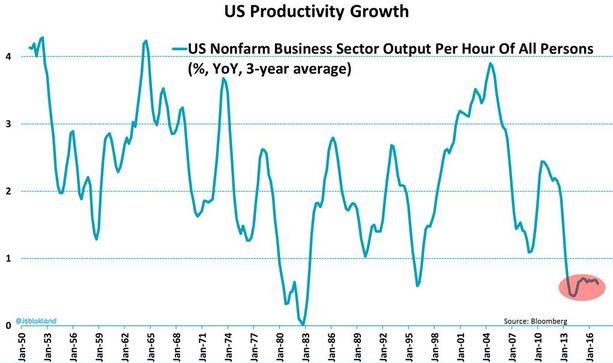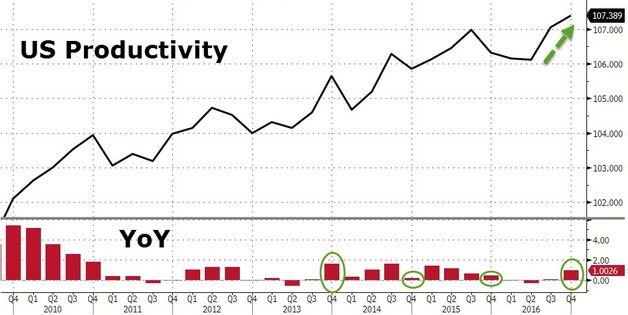Productivity, Growth, and Trade: A Little Freedom Goes A Long Way

Economics really isn't all that complicated: We get wealthier by making more with less. OK, maybe you'll need to know a little more to pass a micro comprehensive exam, but never forget that general rule...it doesn't change no matter how fancy the math gets.
Making more with less seems so simple, so intuitive, but entire political campaigns are run these days on preaching exactly the opposite; that society is somehow better off forcing inefficiency. For instance, Trump's promise to "Make America Great Again" is centered on forcing businesses to produce inefficiently in the U.S. while taxing consumers for buying more efficiently produced goods from abroad.
Wealth Comes From Productivity
This madness comes at a time when "US Productivity Growth Has Never Been This Low For This Long:"

But don't worry, ZeroHedge has a way of sensationalizing everything. Productivity has still never been higher in the U.S., but it is still concerning that productivity growth has approached a 50 year minimum and seems to be stuck there.

It's important to keep things in perspective and realize that productivity growth is cyclical, there have been plenty of other drop offs, and yet still our material well-being has continuously improved. Still, this is concerning...
Productivity Comes From Specialization and Trade
Raise your hands if you think that trade makes for higher productivity. OK, for those of you who didn't...really?
Just think about the computer or smartphone you're using to read this article: do you think you could mine the metals, build your own factory with all of the requisite machinery, learn computer science, software design, and piece it all together yourself without first starving to death trying?
Of course trading with broader society is more productive so you can focus on what you do well; this process doesn't become less productive because it takes place across imaginary lines.
This is why Trump's anti-trade ideas are troublesome. He is threatening to inhibit trade, and hence reduce productivity, at a time when we're already experiencing a drop off in productivity growth.
What's Wrong With the American Economy?
The Grumpy Economist, John H. Cochrane, notes in "What's Wrong With The American Economy?" that:
Growth in the end comes from productivity. New ideas, new companies, new processes, new ways of doing things. Each worker producing more per hour. That's it.
Here's the full interview, which is full of wisdom:
Conclusion
In case you missed it, we get wealthier by making more with less...this is called productivity. When people specialize in what they're good at--or more specifically, what they have relative advantage in--and trade with others, productivity increases; hence, trade makes us wealthier.
Sadly, politics is about appealing to special interests to gain power, which often leads entire countries down dumb policy paths. And yes, if you think you're life will be better off by forcing out foreign competition, you are a special interest because overall society is always better off in the long run with competition, freedom, and choice.
This populist backlash against trade is coming at a bad time of already sclerotic growth and stalled productivity.
What are your thoughts?
If you like this post, please upvote, resteem, or share below! Please check out my other articles and follow @finpunk to keep in touch with future content.
Rob Viglione is a PhD Candidate in Finance @UofSC with research interests in cryptofinance, asset pricing, and innovation. He is a former physicist, mercenary mathematician, and military officer with experience in satellite radar, space launch vehicles, and combat support intelligence. Currently a Principal at Key Force Ventures, LLC, a start-up consulting group in North Carolina, and Head of U.S. & Canada Ambassadors @BlockPay, Rob holds an MBA in Finance & Marketing and the PMP certification. He is a passionate libertarian who advocates peace, freedom, and respect for individual life.
Image source: https://www.cs.cmu.edu/~tlm/homebrew.html
Charts: http://www.zerohedge.com/news/2017-02-02/us-productivity-growth-has-never-been-low-long
Glad to see another article from you. I work in the auto industry so I have witnessed first-hand the offshoring of U.S. jobs. At this point, people just need to accept that the factory jobs that have been lost are not coming back. Trade barriers will do nothing to stop the automation of factories.
Most of the parts my company makes overseas have been turned into commodities. The jobs making these parts only exist because the labor is cheap. If we try to bring these jobs back to the U.S., they will just become automated.
The complicated parts and all of the engineering is still in the U.S. That is where the U.S. needs to be focused-new developments and not trying to roll back the clock to 1960. Putting resources into electric motors and batteries, self driving cars and lightweight materials will be much more beneficial. I'm sure other industries are much the same in this regard. We need to invest in innovation and educating skilled workers, not trade restrictions. Great post. I find it funny that almost all economists are in agreement about free trade, but everyone seems to ignore them.
Always great hearing your feedback, thanks! This was spot on:
"If we try to bring these jobs back to the U.S., they will just become automated."
Also great point that so much of the higher value production is still done in the U.S., like the engineering and design work. You're right in that so much of this anti-trade movement has the flavor of trying to bring society back to the "good ole days" of the 60s.
If products were priced in people/hours then your premise would be true.
Having an american machine a part @$50/hour is, in this paper's terms, less productive than a chinese use a file to make a part for $3/day. So, the american costs $50 and the chinese costs $9. So, the chinese is clearly better? But, if you compare 1 hour with 36 hours?
And lets compare toasters. The $19.95 wallymart special cost about $2 to make. That $100 fancy toaster cost about $3 to make. How do you apply more for less to that? Especially since, in the store, product design is everything, and product durability is nothing.
The biggest stumbling block to this thesis is that everyone has to be assumed to doing something that pays. In that case, the cheaper the better. But homeless people cannot buy televisions, even though they are the cheapest per size they have ever been.
An artist will spend as much time as needed to create their piece. And often the value of the piece will have no bearing on the input of time or resources.
eh, the benefits of trade don't rely on labor hour pricing; i've actually never heard of that before. It's all about relative advantage, labor cost differentials being one such advantage, but there are plenty other factors in production...some real, others artificial like taxes and regulations.
Also, the concept of a social welfare safety net is separable from any trade argument. Trade makes societies wealthier, period. Not everyone within society benefits, though, as trade adds competition which of course means some people in some businesses get out competed. Whether that competition comes from your neighbor or someone living across national borders is irrelevant to the process.
There have always been arguments against competition; that was the entire justification for the destructive guild systems in feudal Europe.
It would be better for society to refrain from forcefully limiting competition and simply providing some safety net after the fact to those that lose out, rather than forcing most of society to lose out by stifling the entire process.
thanks